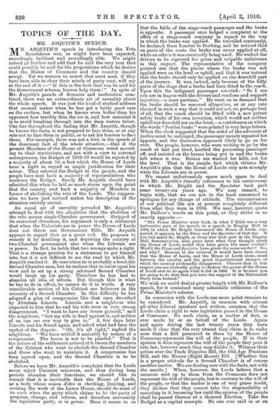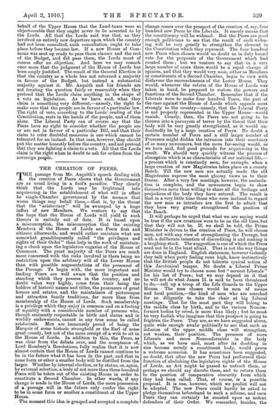TOPICS OF THE DAY.
ASQU1'1'11.'S SPEECH.
MR. ASQ ULU:1'S speech in introducing the Veto Resolutions was, as might have been expected, exceedingly brilliant and exceedingly able. We might indeed go further and add that he said the very best that could possibly be said for the propositions which lie desires that the House of Commons and the country should accept. Yet we venture to assert that most men, if they have been able to clear their minds of party cant, will say at the end of it :—" if this is the beat that can be said for the Government scheme, heaven help them ! " In spite of Mr. Asquith's parade of firmness and moderation com- bined, there was an extraordinary air of unreality about the whole speech. It was just the kind of studied address that counsel makes when he has got a fairly good case on the surface, but when he knows even better than his opponent how terribly thin the ice is, and how essential it is to avoid breaking through into the deep waters below. One has throughout the feeling that Mr. Asquith, though he knows the facts, is not prepared to face them, or at any rate not to face them in public, or to ask his hearers to face them. For example, there was not a hint in the speech of the dominant fact of the whole situation,—that if the present Members of the House of Commons voted accord- ing to their convictions, and not with a view to external consequences, the Budget of 1909-10 would be rejected by a majority of about 50, a fact which the House of Lords have a right to regard as ample justification for their action. They referred the Budget to the people, and the people have sent back a majority of representatives who condemn the Budget. Surely Mr. Asquith should have admitted this when he laid so much stress upon the point that the country sent back a majority of Members in favour of abolishing the veto of the Lords. The suppres- sion we have just noticed makes his description of the situation entirely unreal.
An equal air of unreality pervaded Mr. Asquith's attempt to deal with the allegation that the abolition of the veto means single-Chamber government. Stripped of its oratorical cleverness, his argument is only a statement that when the Unionists are in power the House of Lords does not throw out Government Bills. Mr. Asquith appears to regard that as a great 'evil. He proposes to remedy it by doubling it, and depriving the country of two-Chamber government also when the Liberals are in power. In fact, he holds that two wrongs make a right. That is a strange position for a statesman to get himself into, but it is not difficult to see the road by which Mr. Asquith reached it. By conviction he is probably a bond-fide Second Chamber man, but he realises that to insist upon his view and to set up a strong reformed Second Chamber would break up his party. Therefore he has had to abandon all idea of reform. But though this is what he has to do in effect, he cannot do it in words. A very considerable section of his Cabinet are believers in the necessity of a Second Chamber. In this difficulty he has adopted a plan of compromise like that once described by Abraham Lincoln. Lincoln met a neighbour who imparted to him that he and his wife were in very strong disagreement. "I want to have our house painted," said the neighbour, "but my wife is dead against it, and neither of us can see our way to give in." A few days later Lincoln met his friend again and asked what had been the upshot of the dispute. "Oh, it's all right," replied the neighbour. "We have settled it amicably by means of a compromise. The house is not to be painted." That is the nature of the settlement arrived at b-Aween the members of the Cabinet who want to abolish the Second Chamber and those who want to maintain it. A compromise has been agreed upon, and the Second Chamber is to be abolished.
Before we leave Mr. Asquith's complaint that the Lords never reject Unionist measures, and thus during long periods abandon their functions, we should like to remark that it is inevitable that the House of Lords,' as a body whose raison d'etre is checking, limiting, and revising the work of the Lower House, should do most of its work when the party which claims to be the party of progress, change, and reform, and therefore necessarily the legislative party, is in power. Here it seems to us that the fable of the stage-coach passenger and the brake is apposite. A passenger once lodged a complaint at the office of a stage-coach company in regard to the way in which the brake was applied. He travelled constantly, he declared, from London to Dorking, and he noticed that on parts Of the route the brake was never applied at all, while on others it was constantly being used. He wished the drivers to be reproved for gross and. culpable unfairness in this respect. The representative of the company pointed out that the places where the brake was not applied were on the level or uphill, and that it was natural that the brake should only be applied on the downhill part of the journey. It was, indeed, only because of the hilly parts of the stage that a brake had been fitted to the coach. Upon this the indignant passenger retorted "So I see you are in league with the drivers and condone and support injustice,—a mere partisan." He went on to demand that the brake should be removed altogether, or at any rate chained in such a way that it could not act, or, perhaps best of all, that the coach should be fitted with a new patent safety brake of his own invention, which would act neither uphill nor downhill nor on the level,—a contrivance on which the words "Justice brake" were printed in very large letters. When the clerk suggested that the mir.d of the advocate of justice must be unhinged, the passenger merely repeated his appeals, and the discussion appeared likely to go on for ever. The people, however, who were waiting to go by the coach at last got tired, hustled the protesting passenger off, and insisted on the horses being put in and the brake left where it was. Brakes are wanted for hills, not for the level. That is the simple fact which vitiates Mr. Asquith's plea that the House of Lords only acts strongly when the Liberals are in power. We cannot unfortunately spare much space to deal with Mr. Asquith's friendly references to the controversy in which Mr. Bright and the Spectator took part some twenty-six years ago. We may remark, to begin with, that we are not in. the least concerned to apologise for any change of attitude. The circumstances of our political life are at present completely different from what they were in 1884. We may, however, quote Mr. Balfour's words on this point, as they strike us as exactly apposite :— "The Prime Minister went back, in what I think was a very instructive part of his speech, to a speech in Bingley Hall in 1884, in which Mr. Bright denounced the House of Lords, sup- ported, it appears, by the Times and the Spectator of that day. If you had asked Mr. Bright, or those who took part in the Bing,ley Hall demonstration, nine years later what they thought about the House of Lords, would they have given the same verdict? Would the Times and Spectator have given the same verdict ? No; and why? Because in the interval it would have been shown that the House of Lords, and the House of Lords alone, stood between the country and the great Constitutional changes of which the country profoundly disapproved. Observe that in this respect you are avowedly going to destroy the power of the House of Lords ever to do again what it did in 1893. It is because you are going to do that that you have the support of the Nationalist Party from Ireland."
We wish we could deal at greater length with Mr. Balfour's speech, for it contained many admirable criticisms of the Prime Minister's scheme.
In connexion with the Lords one more point remains to be considered. Mr. Asquith, in common with almost all other Liberal speakers and writers, assumes that the Lords claim a right to veto legislation passed in the House of Commons. No such claim, as a matter of fact, is ever made by or on behalf of the Lords. Again and again during the last twenty years they have made it clear that the very utmost they claim is to make sure that a Bill presented to them by the House of Commons represents the will of the people. If in their opinion it does represent the will of the people they pass it into law, however much they may dislike it. Witness their action over the Trade Disputes Bill, the Old-Age Pensions Bill, and the Miners (Eight Hours) Bill. L W hether this is a proper attitude for a Second Chamber is of course another matter. We are dealing now with the facts, not with the merits.] When, however, the Lords believe that a measure sent up to them from the Commons does not represent the will of the people, but is contrary to the will of the people, or that the matter is one of very grave doubt, they declare that they cannot take the responsibility of assenting to it becoming law until the opinion of the people shall be passed thereon at a General Election. Take the Budget as a capital example. No one ever said in or on behalf of the Upper House that the Land-taxes were so objectionable that they ought never to be assented to by . the Lords. All that the Lords said was that, as they involved an entirely new departure upon which the country bad not been consulted, such consultation ought to take place before they became law. If a new House of Com- mons was sent up ready to pass those clauses and the rest of the Budget, and did pass them, the Lords must of course offer no objection. And here we may remark once more that the judgment of the House of Lords has been amply justified. The result of the General Election is that the country as a whole has not returned a majority in favour of the Budget, but instead a substantial majority against it. Mr. Asquith and his friends are not treating the question fairly or reasonably when they pretend that the Lords claim anything in the shape of a veto on legislation. As we have said, what they claim is something very different,—namely, the right to make sure that the people are in favour of a particular law. The right of veto, according to the Lords' reading of the Constitution, rests in the hands of the people, and of them alone. The Liberal Party can of course say that the Peers have no right to consider whether the people are or are not in favour of a particular Bill, and that their claim to refer doubtful measures is one which cannot be tolerated for an instant. In that case, however, they should put the matter honestly before the country, and not pretend that they are fighting a claim to a veto. All that the Lords claim is the right when in doubt to ask for orders from the sovereign people-











































 Previous page
Previous page